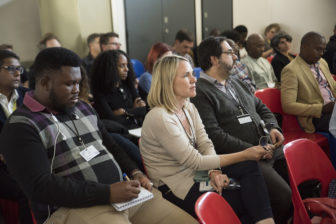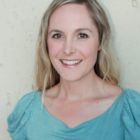
Charles Lewis (left), moderated a panel in which Robert Steiner (center) and Syed Nazakat shared how they get doctors and journalists to work together. Photo: Madelene Cronjé
The difference between scientists and journalists, said Robert Steiner, Director of Fellowships in Global Journalism at the University of Toronto, is that they get excited by different things.
“Journalists will get excited by the outlier,” said Steiner, speaking during a panel titled Scholars, Doctors, Journalists – Collaboration Across Fields. “They’re like: ‘Oh! That [one thing] is going wrong! Maybe that means a bigger story!’
“Scientists are excited by the exact opposite,” he went on. “When they see an outlier their first question is ‘Hmmm, am I getting distracted? What I’m really looking for is a statistically significant trend.’”
This could be one of the reasons why these two professions spend so little time interacting – but that’s something that Steiner and fellow panelist Syed Nazakat, editor in chief of DataLEADS in India, are trying to change.
Steiner heads up a program designed specifically to mentor subject-matter specialists from around the world to become working reporters. The Fellowship in Global Journalism offers an eight-month course that teaches doctors to be health reporters, lawyers to be law reporters, teachers to be education reporters, and so forth.

“The medical framework is very much around the integrity of the data and the info. And that aligns entirely with journalism,” said Robert Steiner. Photo: Madelene Cronjé.
Through DataLEADS, Nazakat runs “data boot camps” around Asia that bring doctors and journalists together to learn from each other and create new platforms of data research and storytelling.
They shared some of the things they’ve gleaned along the way.
1. Many Doctors are Excited to Work With Journalists
At their first data boot camp, held in a rural part of India, Nazakat expected little interest from the doctors in the area. “When the session began we were surprised to see that the room was half full – of doctors! The journalists were trickling in one by one,” said Nazakat. Since then they’ve found increasing interest from the physicians with each of their workshops, sometimes hosting 150 people or more at a single event, with at least half of them being medical workers.
“We now have 1,100 super specialized doctors in 11 countries working with journalists all the time,” said Nazakat. “I think a huge number of people out there are looking for ways to connect with storytellers.”
2. With Beat Journalism Becoming Rare, There’s a Greater Need to Work With Specialists
“As journalists, we have the reporting disciplines to address our knowledge gap,” said Steiner. “But even with that, we need to know what the right questions are. We need to know what qualifies a source. Good journalists get that. But frankly, they usually get that with years and years of reporting experience on a particular beat,” he sad.
“And the problem that we’re facing now is that beat reporters are being laid off. Very few reporters nowadays are going to have a chance to work on a beat for five or six years. So where are they going to develop this kind of judgment on something? The fastest way is to actually know a lot about the subject matter already.”
3. Governments And Schools Are Willing to Fund This Kind of Collaboration
DataLEADS is run as a profit-making business that has not received a single formal grant payment. Their training venues are usually provided by hosts for free. The rest of their costs have been covered by sponsorships. Health ministries, medical colleges, journalism colleges have been the major contributors, and funding for the whole of 2018 is already in place. “We don’t want to turn into a non-profit,” said Nazakat. “As long as there’s demand for this in the market, it will attract funding.”
4. If They’re Careful, Doctor-Reporters Can Remain True to Both Medical And Journalistic Ethics
The obvious concern is that medical professionals acting as reporters might violate the patient confidentiality agreement, thereby damaging trust and credibility in both fields. But Steiner says the Fellowship program puts very clear rules in place. “Our rule to them is that you cannot report on your patients, you cannot report on your mentors, you probably shouldn’t even report on your own research if you’re a researcher,” he said.
Journalism and medicine represent “two different frameworks of values,” Steiner acknowledged. “But they actually dovetail very well. The medical framework is very much around the integrity of the data and the info,” he said. “And that aligns entirely with journalism. When we teach these professionals about news judgment, we teach them that the story needs to have a peg, a news hook; but it also needs to be responsible and not exaggerate the data. We teach a rubric of values.”
5. Even Doctors Find Journalism Difficult
Finally, if you’re feeling disconcerted that subject-matter experts can become functioning journalists in only eight months (while you might have studied for years), take heart.
Steiner shared how a physician attending the fellowship program turned to an emergency doctor and said: “Is this harder than med school?” And she nodded and replied, “Yes, it is.”
 Thalia Holmes is a South African freelance journalist specializing in business, health and long-form feature writing. She has won various national awards for her work. Previously she worked at the Mail & Guardian as a business reporter, and was a management consultant in a former life before finding her passion in media.
Thalia Holmes is a South African freelance journalist specializing in business, health and long-form feature writing. She has won various national awards for her work. Previously she worked at the Mail & Guardian as a business reporter, and was a management consultant in a former life before finding her passion in media.
 Madelene Cronjé is an independent photographer based in Johannesburg, South Africa. Formerly a staff photographer at the Mail & Guardian, she specializes in photojournalism and editorial portraiture.
Madelene Cronjé is an independent photographer based in Johannesburg, South Africa. Formerly a staff photographer at the Mail & Guardian, she specializes in photojournalism and editorial portraiture.
